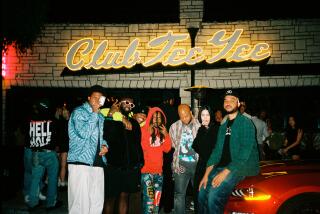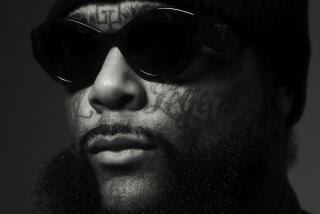Syl Johnson’s modern stroke
It’s been close to 10 years since Chicago soul/funk legend Syl Johnson played L.A. on or off camera. “I did ‘Soul Train’ and ‘American Bandstand’ out there,” said the singer and guitarist, whose 1967 hit, “Different Strokes” (with its signature grunts and laughs), was a calling card of sorts for Johnson. “I used to love L.A.”
After slipping into near obscurity in the 1980s, though, the seventysomething Johnson (who prefers not to give his age) came to L.A. only on rare occasions, usually to play the less-flashy blues circuit. It’s been nearly 10 years since his last show. But Feb. 12 he’ll attend the Grammy Awards, where his 2010 anthology, “Syl Johnson: The Complete Mythology (Numero Group),” is up for historical album and liner notes.
The compilation and samplings of Johnson’s music by rappers such as Jay-Z and Kanye West have exposed the vintage artist to a new generation of listeners, and in turn, revitalized his touring career. “I don’t play venues that big, but I play ‘em big enough, and they’ve been selling out everywhere I go,” said Johnson, who plays at the Echo on Feb. 11. Last fall, he toured half a dozen dates across Australia, all sold out.
This resurgence is just the latest chapter in a remarkable 50-plus-year career that began in Chicago. Johnson, who was born Sylvester Thompson, is the sixth child of Mississippi sharecroppers. In 1950, he and his family joined up with the Great Migration out of the South and headed to Chicago. A prodigy on the guitar, Johnson began gigging with bar bands and studio musicians, backing such blues legends as Elmore James and Junior Wells.
His first break as a solo artist came with King Records in 1959, but the label didn’t like his name, insisting on releasing Thompson’s first single, “Teardrops,” under a new moniker: Syl Johnson.
His early singles leaned heavily toward the snappy sound of early R&B, but Johnson’s distinctive vocals, with their sharp crags and curling cries, were an obvious blues carry-over. But he struggled to land a hit, and by 1967, became a UPS driver to help ends meet. One day that year, Johnson recalls listening to the radio, “I was driving a truck at the time and my song [“Come On, Sock It to Me”] on WVON was No. 1. Man, I got out of that truck, and ain’t been in that truck since.”
His next single — “Different Strokes” — became one of his most iconic, with an opening as unique and memorable as any recorded in funk history: a heavy backbeat, punctuated by Johnson’s grunts, followed by peals of laughter from back-up singer Andrea Davis (later renamed Minnie Riperton). Johnson then attacks the mike: “Baby, you laughing/but I’ll be around for a while/yeah yeah/can’t you dig it, honey?”
“Different Strokes” may sound like a dance tune, but it’s a personal story of Johnson’s inspired from an intimate encounter with a new love interest. “She laughed at me!” said Johnson. “I said, ‘Baby you’re laughing, but I’ll be around for a while.’ That’s exactly why those lyrics got in there, because [she] laughed at me. I needed Viagra, but they didn’t make it then.”
Luckily, Johnson’s career had no such performance issues. He and the Chicago label he co-founded, Twilight (later renamed Twinight), were on a prodigious pace. In 1968, Johnson began working with a young producer out of Memphis, Tenn.: Willie Mitchell of Hi Records. Hi’s musicians backed Johnson on a few Twinight sides and Mitchell was eager to lure him over to Hi, dangling a lucrative advance … but only if Johnson could fly immediately to Memphis to begin recording. “I blew it. I neglected to do it,” says Johnson, and when he followed up with Mitchell three weeks later, Hi’s founder told him: “We’d like to sign you but we can’t make that deal that we were talking about … because we just signed a guy by the name of Al Green.”
Johnson stayed in Chicago and in the fall of 1969 penned what would become his biggest hit. “Is It Because I’m Black?” is a searing indictment of American race relations, inspired by Johnson’s dark moods after the assassination of the Rev. Martin Luther King Jr. The subsequent album by the same name was filled with socially relevant songs, practically unprecedented in R&B at the time. Marvin Gaye’s landmark “What’s Going On?” was still a year away from being released. Despite the obvious political overtones of songs such as “Concrete Reservation” and “I’m Talkin’ About Freedom,” Johnson insists, “I didn’t want to be a militant. I didn’t want to make something that alienated the white audience that I played for a lot.”
Though the single sizzled, the album faltered and Twinight’s finances were in disarray. Johnson escaped to Memphis, finally signing with Hi in 1971. Together, they released three albums to modest success, but Johnson describes Green’s rocketing stardom as a “bumper zone” for other Hi artists to get around. As Johnson stated in the liner notes to “The Complete Mythology”: “I couldn’t get out of the stable with him around.”
Johnson’s career began to slow into the early 1980s and could have fallen into permanent obscurity if not for a younger generation rediscovering his catalog. By the late 1980s, hip-hop artists had begun sampling his songs, none more popular than “Different Strokes.” Dozens of rap artists have looped it, including Ice Cube and the Wu-Tang Clan.
Most recently, Jay-Z and West used it on a bonus track for last year’s “Watch Their Throne” album (Johnson is pursuing legal action against them, alleging unauthorized use). He’s appreciative of the creativity others have applied in reworking his songs but even more, he says, “I enjoyed it ‘cause I got paid!”
Appropriately, for his L.A. gig, Johnson will be backed by Breakestra. Founded by DJ and musician Miles Tackett in the late 1990s, Breakestra began as a live band, covering funk and jazz songs made famous via hip-hop samples. Tackett has wanted to book Johnson for years. “Syl’s voice, production, arrangements and writing inspired me over the last 15 years. He is absolutely a funky soul chief,” he says.
For his part, Johnson remains sanguine about his resurgence. Before his recent string of sold-out soul shows, he’d mostly played the blues circuit. But for the Echo gig, he knows what his audiences will want: “It’ll be old school R&B — it’s what the young kids like now, they like the ‘60s stuff. If you notice, when they get on ‘American Idol,’ they gotta sing old school R&B!”
More to Read
The biggest entertainment stories
Get our big stories about Hollywood, film, television, music, arts, culture and more right in your inbox as soon as they publish.
You may occasionally receive promotional content from the Los Angeles Times.






